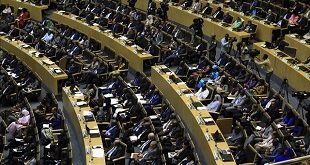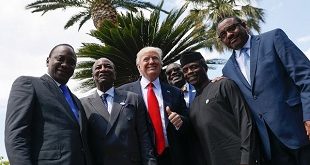
But experts says number of jabs too small for populations battling third wave
Kampala, Uganda | RONALD MUSOKE | Following recent calls from African leaders to manufacturers and rich countries to ensure equity in distribution of the desperately needed COVID-19 vaccines, the World Health Organisation (WHO) Africa Region Office has reported a marked increase in shipment of the vaccines over the last two weeks.
About four million doses from the COVAX Facility arrived in Africa in the last week of July compared with just 245,000 doses throughout the month of June, Dr Matshidiso Moeti, the WHO Regional Director for Africa said July 29 during a virtual briefing organised by the Africa Centres for Disease Control and Prevention.
In comparison to the 245,000 doses which were supplied to just six countries in the whole of June, over the past week, 3.8 million vaccine doses were delivered to 13 countries through the COVAX Facility bringing the total doses delivered so far to the continent to 82 million.
On the face of it, the arrival of the vaccines is great news. But it masks the bigger story of the unmet demand for COVID-19 vaccines across Africa.
The 4 million delivered vaccines are a tiny fraction of the 60 million doses COVAX has allocated to 49 African countries to be shipped between now and September, this year.
Africa has a population of slightly over a billion people but just 82 million COVID-19 vaccine doses have so far arrived in Africa.
As of July 29, only 21 million people, or just 1.6% of Africa’s population, were fully vaccinated according to the Africa Centres for Disease Control and Prevention. Yet, the African Union has set to fully vaccinate 30% Africa’s population in the next five months.
In order to achieve this target, Dr. Moeti said the continent will need up to 820 million doses to meet the two-dose schedule target. But COVAX intends to ship only 520 million doses to Africa by the end of 2021.
“We cannot get ahead of the virus if vaccines are not reaching a significant proportion of this population,” Dr. Moeti said.
Despite some recent gains, she said, Africa’s greatest barrier to overcoming this pandemic remains vaccine inequity.
Uganda is among the recent beneficiaries of the COVAX arrangement—the global pact between governments and manufacturers cooperating to ensure COVID-19 vaccines are available worldwide to both higher-income and lower-income countries.
On July 29, the Ministry of Health announced a shipment of 286, 080 doses of the AstraZeneca vaccine would arrive in the country on July 30 and another 300,000 doses of the Sinovac vaccines from China would follow on July 31. Before the arrival of the latest consignment, Uganda had received 1,139,000 doses of the AstraZeneca vaccines.
But the total vaccines received so far are way below the 3.6 million doses that Dr. Jane Ruth Aceng, Uganda’s Health Minister, promised would have arrived by June this year.
Dr. Aceng said, according to the country’s vaccination roadmap she announced on March 02 this year, Uganda requires up to 45 million doses to vaccinate up to 22 million people aged above 18 years in a phased manner.
However, to date, less than one million people have so far received at least one of the two recommended jabs and less than 300,000 people have received the two recommended jabs.
According to Dr. Aceng’s original roadmap, she expected 18 million doses to arrive in the course of this year. But with seven months gone, Aceng’s target appears way off the mark.
Cautious optimism
That is why Dr Moeti’s warning is critical.
“There’s light at the end of the tunnel on vaccine deliveries to Africa but it must not be snuffed out again. I urge all countries with surplus doses to urgently share more in the spirit of life-saving solidarity and enlightened self-interest, because no country is safe until all countries are safe.”
“Africa is still in the throes of the pandemic’s third wave, although there has been a slowdown in cases in the last two weeks. We need to monitor these limited gains closely—some optimism—but we are not out of the woods yet,” she said.
She said vaccine deliveries from the African Union’s Africa Vaccine Acquisition Trust (AVAT) are picking up, with a projected rise to 10 million each month beginning this September. Moeti said around 45 million doses are expected from AVAT by the year’s end.
Recently, the African Union clinched new deals with Chinese vaccine manufacturers Sinopharm and Sinovac to rapidly supply 110 million more doses to low-income countries.
COVAX and the World Bank are also set to further boost COVID-19 vaccine supply for developing countries through a new cost-sharing arrangement that allows low-income countries to purchase doses beyond the fully donor-subsidized doses they are already receiving from COVAX.
More countries are also starting to donate from their own supply and direct them to where they are most needed. For Africa, this is translating into vaccines on the ground and protecting the lives to where they are most needed.
About 30 countries across the continent have so far used more than three-quarters of the vaccines they received. Seven countries including; Equatorial Guinea, Mauritius, Morocco and Seychelles have reached vaccination rates significantly above the continental average.
Dr. Moeti noted that with the expected influx of vaccines, it is crucial that countries scale-up all the aspects of vaccine rollout to reach as many people as possible.
This, she said, entails mobilizing adequate resources including finances for the vaccination activities, logistics and personnel as well as addressing any concerns by communities to increase vaccine confidence.
On the confidence front, Tanzania; a laggard in terms of vaccine intake has since joined COVAX. It joined on June 15 and on July 26 the country received its first consignment of 1,058,400 Johnson & Johnson vaccines from the U.S Government via the COVAX arrangement.
“The vaccines that arrived today and all the vaccines arriving in Tanzania over the coming months, have all been vigorously tested and deemed safe and effective by some of the best vaccine experts in the world. I therefore urge everyone who is offered the vaccine to take it,” said Shalini Bahuguna, the UNICEF Country Representative to Tanzania.
Moeti said WHO continues to support countries to better plan and cost operational and delivery processes. In the first phase of the rollout, countries were unable to unlock funding because costing plans often omitted critical expenses, such as the cost of remuneration of vaccinators, administration, cold-chain storage, logistics and sub-national distribution of vaccines to the delivery points.
 The Independent Uganda: You get the Truth we Pay the Price
The Independent Uganda: You get the Truth we Pay the Price


